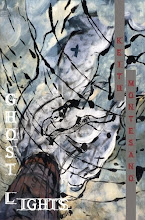One of the things I've been doing lately is trying to compare book-published poems with journal-published poems. How do you do that? Why in God's Good Name do I actually take time to do that, and what the hell is wrong with me? Well, it's easier with something like Blackbird. Since I went to VCU, Blackbird was talked about everywhere and all the time. I never worked for Blackbird in any capacity, but I always read it. And like I said, lately I've been oddly interested in comparing "finished" products with the journal-published poem, or draft, or whatever you would like to call it.
I was first curious about this with Jake Adam York's book, A MURMURATION OF STARLINGS. I will always seek out Jake's work, and I always have, and it was interesting to see what edits he made to recent poems that are in his book which previously appeared in Blackbird. Buy his book and compare if you want to see the changes. I won't post them here.
But, the changes were sharper, more fluid, and overall good choices. In this humble opinion. Poets have the opportunity, apparently, to change their work for books, since most presses explicitly say that, or should I say most "contests," considering the recent CPR things afoot (I can't stop linking this). But maybe it is with most contracts and whatnot. I don't know.
I was curious about Victoria's book, however. Most of us know, I hope, that you can sample single poems by looking at the table of contents on Amazon (with a SEARCH INSIDE! on the cover), usually before they cut you off, though if you wanted to have the whole book, you probably could.
That said, I checked out some Blackbird poems of Victoria's, and "After Hanging Mao Posters" and "Postmortem Examination on the Body of Clifford Baxter" are spot on exactly the same. She didn't change a thing. I always expected poets not to change a thing from journal to book. And now I know that's different. But it doesn't matter what I think.
Then I checked out "Jiang Qing," and though it doesn't seem like an entirely different poem necessarily, it's hard to imagine that the poem appearing in her book and the poem appearing in Blackbird are the same.
The link is there above, but here's the text for side-by-side, Blackbird first:
*
Jiang Qing
—Mao Ze Dong’s wife committed suicide while under
house arrest for crimes related to the Cultural Revolution.
Now the fires are all out. My throat hoarse
and husky. Swallowing pork can blow my head
to pieces, everything too thick for my shrinking
tube, even a sigh, all my breaths are sighs now.
How I used to speak so sleekly in pavilions, even
crows and clouds came down to hear. But now
they blame me for deaths, even for the rain in Venice.
But I think it’s the tops of trees that make the first
sound of rain. How I want to lie with you again,
your stubbled face on my neck. How I want to
see the darkened halls of your mind, eyes that
boiled me. How I want to cut down this paper city,
ask you to rebuild it in red, center it. I want to
smear your lips on mine, fasten your thoughts into
my head. Here is a hammer. Here are some nails.
With each new thought, your hand around my neck
my own brain. Soon the wind will inhabit my shadow.
*
Now here's the comparison text of the poem that appears in Victoria's second book, SALVINIA MOLESTA:
Jiang Qing
—Mao Ze Dong’s wife committed suicide while under house
arrest for crimes related to the Cultural Revolution.
Now the fire is sick. My throat, hoarse
and husky. My throat cannot take swallowing,
everything too thick for my shrinking tube,
even a sigh, all my breaths are sighs now.
I used to speak so smoothly in pavilions, even
crows and clouds came down to hear. Now they
blame me for deaths, even for the rain. I think
it's the rain that kills with its endless dropping.
I want to lie with you again, your cheek on my neck,
to see the darkened canals of your mind, eyes that
lied to me. I want to cut down this paper city, ask
you to rebuild it in red, center it, to smear your lips
on mine, fasten your thoughts into my head. Here
is a hammer. Here are some nails. With each new
thought, your hand around my neck still indents
me. Soon the wind will overtake my shadow.
*
I prefer the first version overall. But what was the first? I almost feel like the book-published version was the draft, and she went back to it post-Blackbird, which was the more polished of the two.
I guess I just come back to always questioning. Does publishing poetry always necessitate the Paul Valery comment: "A poem is never finished, only abandoned"? If poetry's such a distilled art, down to word choice, line break, rhythm, music, everything else (whatever that is), then how do we not eventually abandon our work if we're always changing it?
I always see poems by others where I'd make different choices all around. Probably most would do the same. One of the things Wojahn said to me in his office a few years ago was, "You need to get your poems how you want them to sound, how you want them to look, and how you want them to feel." I think there are too many people writing poems who don't keep that in mind. And we all should. But when is there a definitive version? Is there ever?

